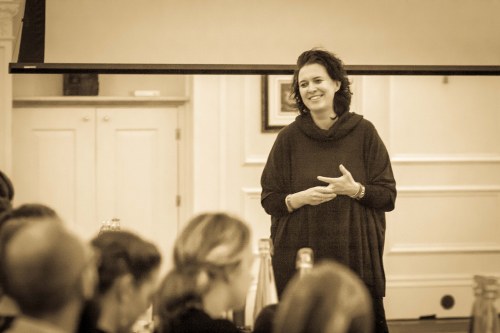
Michelle Wright was a professional violinist who started her business in May 2009 after a stint at a music education charity revealed to her how difficult it had become for charities to survive following the onset of the financial crisis in 2008. Fundraising wasn’t the half of it. Sustainability came with strategy as well as support and Michelle created Cause4 to help charities, social enterprises and philanthropists develop their charitable programmes. Michelle champions disruptive philanthropy and new ways of scaling up charities and social enterprises. She’s spearheaded programmes for the likes of Santander, Cineworld, Close Brothers and The National Gallery. An award-winning entrepreneur, Michelle’s company has raised more than £46 million for charitable clients and works with a range of charities, social enterprises and philanthropists and their causes in the UK and internationally. Cause4 qualified as a B Corporation in 2016, one of only 87 in the UK.
Cause4 has won a string of awards including for founder Michelle Wright, as female entrepreneur of the year at the Natwest Start Up Awards 2011. The company is a top 10 winner in the Ernst and Young Future 100 awards 2011, a winner in the 2012 Startups 100 list for most innovative small businesses across the UK. Cause4 has also won two silver international Stevie Awards for innovation and in 2014 has been selected as a National Champion representing the UK in the European Business Awards.
Cause4 was also recognised as one of the top 25 Hyper-growth organisations in the UK having joined the Government’s Growth Accelerator Programme in early 2013 and was invited to be part of Accelerate 250 – an invitation by Lord Young of Graffham (PM’s enterprise advisor) for the UK’s top 6% of small businesses showing high growth potential. In 2013 Cause4 was awarded a fast-growth Award from Unltd and was also recognised in the Silicon Valley UK 100 list for the top 100 UK companies showing potential to generate multi-million pound revenues.
What inspired you to start a business?
“In the back of my mind I always thought that I might want to start a business. Up to that point my career journey had been slightly unusual. I had trained as a violinist at London’s Guildhall School of Music & Drama – and then had a five-year career as a professional violinist playing in London orchestras. Then completely by chance, I found my way into the charitable sector where I worked in a variety of communications and marketing roles and eventually became a Chartered Marketer.
Immersing myself in the world of arts and social charities I eventually accepted a role as Marketing Director of a socially-driven theatre company in the East End of London. The job turned out to be both a baptism of fire and fortuitous in equal measure. On my first day, one of the Directors said ‘forget marketing, we need to raise £1m this year just to keep the charity going,’ and on that note….and quite by accident, I found myself plunged into the world of charitable fundraising. For a year I had to learn quickly to try and raise the money that would keep the charity on its feet. With no track record to speak of, I could only work on instinct and to be as creative as I could in positioning the organisation to be as attractive as possible to a wide variety of funders and supporters.
When the last recession hit in 2008 that was when the idea for setting up Cause4 was born. I knew at that moment that the world had changed and that the charity sector was therefore going to also have to change, grow and respond, and as such I wondered if there was scope for a small organisation to work more entrepreneurially in the charitable sector, to specialise in creating programmes of scale and to look at developing interesting partnerships that could navigate what was set to be an ongoing challenging financial climate for charities.….and over several too many glasses of wine in early 2009 (with my two fellow Directors) this small idea became reality.
What is the greatest challenge and the greatest reward in being your own boss?
It is rather difficult to understand how we’ve got to where we have – starting with a small idea that suddenly got much bigger. With any fast-growing SME, our key challenge has been that the reputation and opportunities for the business have grown far faster than the infrastructure or staffing we have been able to put in place. We are now seeking to put in place as many processes as we can to ensure that we continue to deliver a quality service. We know that not taking care of our processes and clients as the business grows is a key risk for us. The other key challenge has been a personal one for me – a successful, demanding business that would keep me busy is a dream come true – and in seven years I haven’t been bored once. However, it is increasingly difficult to keep fiery and energized with a 24/7 programme of delivery. The model we’ve created is intensive – the ability for us to develop the programmes for charities and fundraising is often the difference between success or failure and so therefore it’s pressurized and the stakes are high….
The reward of course is to be able to create work and tackle interesting issues that feel important. We have also now created a flexible business model, so when I became a Mum for the first time in September last year I can to some extent manage my work around my young son, which feels so important and a great privilege – but to get to that point takes time!
What motivational tips can you give to our members about goal setting and managing both successes and failures?
Managing a small business is a roller-coaster. One of the solutions I have had to ride both the rough with the smooth has been to bring a great group of advisors around the business – people that can advise impartially and honestly. We also have to make sure there is constant feedback from clients and staff and to respond quickly whenever anything needs fixing. This can be an exhausting process but in terms of goal setting what I recognise now that in the context of realising a bigger vision, getting to successfully put this in motion, is all about a series of tiny adjustments to how you operate, and to get better at what you do. You can’t miss out the important step, if you try quality suffers.
What is the biggest challenge you have faced as a business owner?
The biggest challenge we have had, seems to be one that all small businesses face and that is recruiting staff with the right entrepreneurial mindset to cope with the demands of the business and the innovative and fast-paced way in which we aim to work. Having brilliant people as part of the business that are able to deliver for clients is essential. In particular, we have struggled to recruit senior people into the team to support growth.We are now trying out a number of new talent initiatives, including a graduate talent programme and new partnerships with recruitment agencies that understand about small businesses.
How have you benefited from mentoring or coaching?
Entrepreneurship most certainly isn’t for the faint-hearted and recognizing your boundaries has to be the priority. Therefore, I’ve also needed to find a combination of support and activities that can help me cope with the demands of the business. I have worked with an executive coach for three years now, which has been invaluable. Just having a confidential sounding board to talk through challenges in relation to the business has been important, and allows me to move work forward more quickly.
What advice can you give about the benefits of networking?
In the turbulent journey of running a start up business, there is nothing so leveling as networking with other entrepreneurs, finding out the realities, sharing information and realizing that however challenging it feels for you as an individual, everyone is facing similar issues.
When I look back to the time in early 2009 when I began telling people that I was about to set up Cause4 I had many people who told me that we would struggle or that I shouldn’t give up a regular wage and a promising career in the charitable sector. It is not lost on me that most of these detractors were other women! I think that female entrepreneurs in particular suffer from a lack of positive role models. This coupled with the fact that women tend to be more cautious than cavalier about enterprise means that there is a whole generation of young people (and especially females) that never take the plunge into enterprise. I’ve been lucky enough to be able to work with Santander over the last two years to develop a national network for female entrepreneurs which I hope will support a generation of female entrepreneurs to be confident to scale their businesses and to support each other.
What are your tips for scaling a business and how do you plan for and manage growth?
It’s so tempting to grow too fast if the work is there. And that’s fine if you have the resources to put in place the infrastructure, processes and systems that you need to sustain growth – but most small businesses don’t. In the last year, we’ve had to step back, get smaller again and focus on putting right the systems and infrastructure we need for the future, something we should have done four years ago. There are no short cuts – much better to be a methodical tortoise than an out of control hare. With hindsight I would now advocate a programme of managed growth that goes a bit slower with infrastructure developed alongside.
What does the future hold for you?
I can honestly say that setting up Cause4 has been the best thing I’ve ever done – I’ve learned loads, understood my strengths and weaknesses and experienced both success and failure in equal measure. In developing a new business model, we’ve got our supporters and advocates and a healthy share of detractors, as any disruptive new business is likely to have – it will be interesting to see what the next stage brings. I hope that Cause4 will continue to take on a number of challenges in the charity and philanthropy sector and to give new graduates their start into the sector. Hopefully as we invest in our digital capacity and infrastructure our footprint will get increasingly international and we will be able to take on programmes that can affect real global change.








